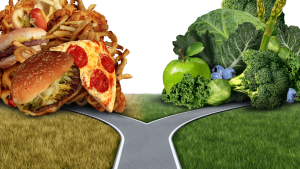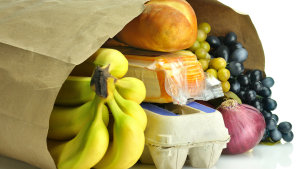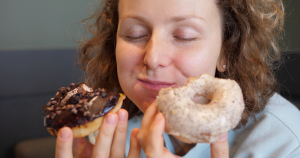The chatter can be relentless, unpredictable, even unwarranted. But one thing everyone who hears it will agree on: food noise is LOUD! It makes itself known for reasons both necessary and unnecessary. And that dichotomy is rooted in everything from research to body image to eating disorders to controversial medications.

But what exactly is food noise? And who is listening to it…and why does this chatter even exist?
What Does Food Noise Sound Like?
The short answer? Pretty much anything that translates to:
- When can I eat again?
-
- Where can I get something to eat?
- I may have just eaten, but I’m still hungry.
- I’m jonesin’ for (fill in the blank).
- I need something sweet. Thank goodness 7-11 is open 24 hours!
- Donuts in the break room? It’s a great day at work!
- Maybe if I open the refrigerator again, I’ll find something that wasn’t there a minute ago.
- Do we have anything to snack on?
- How many calories are in this?
- I need to weigh myself before I eat that.
- How do I avoid eating?
- What do I need to do about what I shouldn’t have eaten but did?
- I need to not eat x,y,z.
- What will others think if they see me eating this?
- I feel guilty for what I just ate.
- Food will make me feel better.
- Food is my enemy.
- I can’t resist….
- I must resist….
- I hate my body.
- Maybe I should fast, increase my exercise, and/or get on a weight-loss drug.
- I can’t go (wherever) because there will/won’t be food.
- How am I going to lose this fat?
- I can’t fit into my clothes anymore.
- I need to purge.
- I’ll start over on Monday.

And that’s just the internal chatter. It doesn’t even begin to speak to the cacophony of external hecklers: advertising, social media, abundant food choices, Diet Culture.
In other words, food noise is the constant, often ruminating chatter about food and related topics. It’s an itch you can’t scratch away, an audio loop with no off-switch. And not only is it loud, it can be a cruel motivator.
Sometimes you may not even be consciously aware of it. But you’re aware of an impulse to acquire or resist food. You’re aware of food-driven feelings, whether positive or negative.
And you’re aware of the noise’s interference with your concentration and ability to function without food-related distractions.

Where Does Food Noise Come From?
Let’s start with what may sound too obvious to mention: Food is necessary for survival. You have to have a relationship with it.
So there’s a biological factor to food noise. (More on that in a bit.)
And that makes conditions like eating disorders especially sensitive and dangerous. You can’t eliminate the “substance” in question.
For those of us blessed to live in food-abundant environments, however, there is more at play than mere necessity. We have availability, access, choices…and constant triggers.

In other words, food is everywhere: home, work, restaurants, drive-thrus, advertising. We keep it in our purses, knapsacks, nightstands, and cars. (You know, just in case Armageddon hits before we get across town or even wake up.)
And who of us, when invited to an event, doesn’t immediately wonder about the food and beverages that will be available?
Whether we weigh the thoughts in anticipation or avoidance-preparation, our minds inevitably turn to food. “What can I bring?” we ask, as if we couldn’t possibly survive a few hours of human interaction without eating. It would spoil all the fun.
(And just think of the disruption to party dynamics if there weren’t a food table where the introverts could gather.)

The point is, voluntarily or not, we channel a lot of brain power at the topic of food. And that’s not necessarily a bad thing, given that the experience of food extends beyond mere survival.
But, like just about anything else in life, food’s role has a tipping point, especially in food-abundant environments.
We must have it to survive, which means we must have a conscious, responsible, “healthy” relationship with it.
But that’s easier said than done, especially in a cultural context that isn’t limited to group hunts and crop-sharing.
Thanks to the myths of Diet Culture, restriction has become a mantra for body acceptance. “Thin is in,” and it’s part of privilege and success.
So the “noise” around food isn’t simply a reverberating call to satisfy a physiological need. Nor is it an unquestioned RSVP to a memorable experience elevated gustatorially.

Food noise has become an ongoing internal debate about good/bad, should/shouldn’t, will/won’t, beautiful/ugly, worthy/unworthy.

And, like the technology and social media that have all but taken over our world, it never shuts up.
The Science of Feeding Regulation and Food Noise: Homeostatic And Hedonic Hunger
Living in a food-abundant society can play mind games with the concept of hunger. I suspect that many Americans, for example, are casual in their use of the word “hungry.”
It’s not that we can’t distinguish a “feeding” urge from any other urge. It’s that we often can’t distinguish a feeding urge for nourishment from a feeding urge for pleasure.
And that distinction isn’t always so distinct, precisely because there are both anatomical and functional overlaps in the controlling neurocircuitry.

Hungry? Hangry? It all starts to run together when the food-noise volume hits high-decibel.
Recognizing food noise is one thing. But understanding it requires a deeper look into its physiological and environmental causes.
Homeostatic hunger
Nature, in all her perfection, has accounted for the natural ebb and flow of energy and its stores within the human body.
As one of the two complementary pathways controlling food intake, homeostatic hunger increases the drive to eat when energy stores fall.
It’s the body’s innate acknowledgment, if you will, of what it needs to maintain consistency in energy availability. Thanks to specific circulating hormones, the brain is alerted to available energy stores and the need to replenish or offload them.
You may hear this homeostatic-hunger “food noise” first thing in the morning or after a hard workout.

You may hear it after working for several hours without a break.
If you are a postnatal mother, you may hear your body’s feeding signal after nursing your baby.
And you may be surprised to hear it more often following surgery when your body is using extra energy to heal.
Homeostatic hunger is so primal that, when its signals aren’t met, basic survival functions suffer.
Food-insecure children, for example, suffer physically, emotionally, academically, and socially. Imagine having an increased, physically driven motivation to eat but not having access to food. This is hunger.
In terms of food noise, homeostatic hunger is the body’s metabolic regulatory signal. Compare that to hedonic hunger, which is explained below.
Hedonic hunger
In terms of feeding regulation, the complementary drive to homeostatic hunger is hedonic hunger. Unlike the metabolic basis of homeostatic hunger, hedonic hunger is reward-based.
And this regulation is so powerful that it can override its complementary regulation, even when energy stores are plentiful. In other words, your body can be signaling satiety (fullness) while internal chatter keeps you preoccupied with cravings.

In-depth research has been done on regulatory feeding drives and their relationship with the brain’s reward system. Although drugs of abuse are mediated only by the reward pathway, the brain exhibits some similarities in response to highly palatable foods.
Interestingly, similar neuroadaptations were found in terms of exposure to food and drug rewards and the motivation to obtain them.
What does that mean in terms of food noise?
It means, in simple terms, that environment and exposure are powerful influences.

It also means that there is more to sneaking to the break room for a second donut than a mere breakdown in willpower.
Circuit overlap
It’s important to note that these two feeding circuits don’t operate in isolation. (For a [very] detailed explanation of research into this overlap, read here.)
In terms of intervention for food noise and eating behavior, an overlap may open new discussions regarding certain medications.
Does Food Noise Affect Everyone the Same Way?
Not everyone experiences food noise the same way. A number of factors, both internal and external, can influence the “volume” for any individual.
Some examples of factors influencing food noise include:
- Genetic predisposition
- Personal body image
- Personal history with food
- Family and home environment (e.g. How do other family members perceive their bodies and relate to food?)
- Participation in sports and the specific kind of sport (e.g. weight-conscious sports like gymnastics and wrestling)
- Anxiety or other emotional distress
- Natural tendency to ruminate, worry, or self-criticize (e.g. Highly Sensitive People)
- Social cliques (e.g. the “popular” group vs. the “nerd” group)
- Rules around eating at home (e.g. eating when hungry vs. structured times)
- Types and availability of food at home/school/work
- Childhood memories regarding food (e.g. food insecurity and food stamps vs. constant availability of food and healthy choices)
- Body type/size
- Perfectionism
- Entering college and living with roommates
- Aging
- Being told to lose weight for medical reasons
- History of dieting
- History of disordered eating and/or eating disorders (self and/or family)
- Living in a city with fast-food and restaurant choices along every street
- Television cooking shows and competitions
- Food advertising and jingles that stick in your mind

As you can see, food noise comes from everywhere. But ultimately it’s what happens on the inside that becomes the motivation for seeking or avoiding food.
Food Noise and Body Image
That “inside connection” means that food noise and body image are inextricably connected. What you hear and how you filter what you hear can’t be separated from your personal relationship with your body.

Do you love your body? Feel gratitude toward it? Accept it, regardless of flaws?
Do you think of food in terms of how it can nourish and provide for your body’s needs?
Or do you think of food as a means of punishing, shaping, or manipulating your body?
How do you feel about your body when you eat certain foods? Does what you eat (and how much) dictate how you perceive your body and your worth?

If you listened carefully to the things you say to yourself regarding your body and food, what would you hear?
Are you able to concentrate without your thoughts always redirecting to the topic of and quest for food?
In many ways, there’s a bit of the “chicken or egg” puzzle to the relationship between food noise and body image.
A healthy body image, for example, becomes its own filter for the barrage of internal and external food noise. It helps you to hear food differently than if you have an unhealthy body image.

I’m not going to give up enjoying the holidays in order to avoid all the tempting food. I have enough self-confidence to indulge without regret. Besides, being around happy people makes me feel good about myself.
Likewise, constant food noise, especially when negative, can influence how you feel about your body.

Why can’t I ever stop at just one slice of pizza? I have no self-control. I know everyone thinks I’m fat, and I’m the only one to blame. I’m too embarrassed to go to any holiday parties this year.
Food Noise: Good, Bad, or Indifferent?
Despite how negatively you may perceive the constant chatter, food noise isn’t necessarily a bad thing.
Returning to the discussion of homeostatic hunger, your body’s cues and motivation to eat are inherently good and self-preserving.
And what makes one person want to scream “Make it stop!” may not even register on another person’s radar.
The purpose of shining this light on food noise is not only to give it a name. It’s also to help you identify and recognize those factors that influence your appetite, feeding motivation, body image, and self-worth.
Knowing the noise for what it is – and where it is – is the first step toward discretion. Does this noise and its message serve me? And, if not, how do I quiet it so it doesn’t control my life and my sense-of-self?
We will be exploring those quieting options in future articles. In the meantime, rest assured that food noise isn’t just your imagination or a lack of willpower.

It’s real.
It can be loud.
And it can also be turned down.
Dr. Elayne Daniels is an international coach, consultant, and psychologist specializing in eating disorders, body image, and High Sensitivity. She is anti-diet, Intuitive Eating certified and passionately believes comfort in your body at any size is your birthright. Contact her here for more information.


